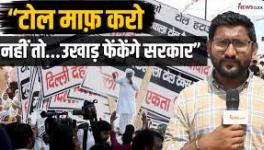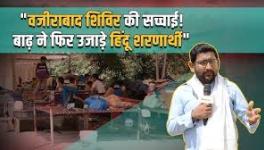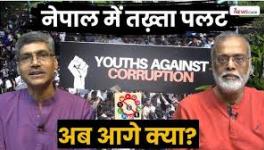Iran Elections: A question of legitimacy
One of the key problems of Iran elections is the completely opaque character of the electoral process (A primer on Iran's Electoral System ). The slate of contestants have to pass through a screening by the Guardian Council, who scrub the list of all known or suspected dissidents. The polling is conducted, not by an independent Election Commission, but by the Interior Ministry. The Interior Ministry reports to the President, who in this case is also a contestant. All this means that if a controversy of poll fraud arises, it becomes credible, as the body conducting the elections is overtly partisan. The lack of legitimacy springs not only from what might have happened, but also by the nature of this partisan electoral process.
Nevertheless, one has to grant that the elections in Iran have not had large-scale fraud in the past, even the democracy is limited (The Conservative Restoration & Limits to Democracy in Iran). If this has happened this time, this would be a first and a virtual coup d'e tat by the Revolutionary Islamic Guards, whose leader is Ahmadinejad. It would also indicate a deep division within the Iranian regime, as Mousavi and Rafsanjani, the opposition to Ahmadinejad, are all a part of the Iranian establishment. A politically split Iran will only weaken its presence in the region. For those looking for an Iranian engagement with the West Asia peace process, this is bad news.
Did Ahemdinijad steal the election as is being claimed? While there are some serious question on the conduct of the elections (Iran's Ex-Foreign Minister Yazdi: It's A Coup, Robert Dreyfuss), one must also note that the only independent poll survey carried out in May by a respected, non-profit organisation (Terror Free Tomorrow) reported that Ahmadinejad was leading over Mousavi by a 2:1 margin, virtually the same figures that finally were declared by the Interior Ministry. This survey was carried out over 30 provinces and showed that even amongst Azeris. Ahmadinejad was leading by virtually the same margin. This also shows that the argument being advanced that Mousavi could not have lost in Tabriz, as he is a Azeri who are in a majority there, is not a strong one. The poll showed that the only sections that Mousavi was leading, were the university students and relatively better-off voters. There was indeed a class divide amongst the voters.
Ken Ballen and Patrick Dohery who conducted the survey, wrote in Washington Post “Some might argue that the professed support for Ahmadinejad we found simply reflected fearful respondents' reluctance to provide honest answers to pollsters. Yet the integrity of our results is confirmed by the politically risky responses Iranians were willing to give to a host of questions. For instance, nearly four in five Iranians -- including most Ahmadinejad supporters -- said they wanted to change the political system to give them the right to elect Iran's supreme leader, who is not currently subject to popular vote. Similarly, Iranians chose free elections and a free press as their most important priorities for their government, virtually tied with improving the national economy. These were hardly "politically correct" responses to voice publicly in a largely authoritarian society.”
Many have claimed that Ahmadinejad popularity grew after he openly attacked Rafsanjani , the former President and admittedly one of the richest man in Iran. While Rafsanjani is identified with that section in Iran, who would like to move towards a more neo-liberal market economy, he is also very much a part of the Iranian establishment. Therefore, the elections in Iran are also about competition within the regime. Ahmadinejad's victory – whether through fraud or through genuine votes -- does show that there is clearly a struggle within the regime.
While the poll survey does give some substance to the claims of a legitimate Ahmadinejad victory, why is there so much anger against the verdict? If the people have Iran have indeed voted for Ahmadinejad, surely the movement against his victory would have lacked popular support? What then explains the surge of people in the streets in Tehran and elsewhere?
A major section of the people who are today on the streets do not trust the theocratic state running Iran. They want a more transparent and democratic government and not a state in which religious police and a Guardian Council dictate what people will wear and think. They are the ones who turned out for Mousavi in large numbers and believed that they could get some reforms through Mousavi winning the elections. Even if Mousavi was a part of the same establishment.
The credibility of the Iranian regime has eroded further the way the Guardian Council behaved. They are supposed to wait three days and address electoral challenges before declaring the result. Instead, the Supreme Leader, Ayatollah Khamenei endorsed Ahmadinejad's victory even before the formal process was complete. Though he has now asked for an examination of the complaints made by Mousavi and Karroubi, another of the presidential candidate, this has been seen to be too little too late.
An election is supposed to give legitimacy to the new incumbent. This has not happened in this election. In fact, what has emerged after this election is a sharply polarised Iran in which the ruling regime has a serious credibility deficit. The post election conduct of the Basij militia has been widely criticised. On the flip side, the large number of women in the protests show that the Ahmadinejad mind-set that demands any women wanting to study needs a permission from the male members of the family, is coming up against popular resistance.
Unfortunately, the safety valve of the Guardian Council, who can arbitrate between various ruling factions, is no longer effective. Khamenini stands no longer as an independent arbitrator but as one who has already endorsed Ahmadinejad.
There are two possibilities of what can happen. The protests snowball into some thing bigger leading finally to the full armed might of the state being used against the protesters. The Iranian regime would survive but be severely damaged. The other option is for genuine reforms within the electoral process and a re-election under such a scheme. It should be obvious even to those who support the current victory that an electoral process, which is so opaque, can only rob the result of its legitimacy. If the election results have to be credible, so has the process.
The international media as well as the blogosphere has already decided that the electoral verdict was achieved through rigging. That seems to be a matter of faith (or a lack of it). The fact that the interior ministry was in charge of every aspect of the election including the counting, a process shielded from the public eye, does give ground for suspicions, but that in itself is not proof of wrong doing (Ahmadinejad won. Get over it by Flynt Leverett and Hillary MannLeverett) .
The survey quoted earlier also showed that Iranians want a greater degree of freedom and also want the Guardian Council to be elected. The protests show the degree of support such calls have. Genuine electoral reforms should now be part of the dialogue to resolve the current standoff.
For the world, the key issue is going to be Iran's nuclear energy plans. Already, the propaganda mills of the US and Israel have started the theme that once Iran generates more than 1000 Kg of Low Enriched Uranium (LEU) in their Natanz facility, they would have crossed the nuclear Rubicon and proceeded to the bomb. The idea is to stampede public opinion in the West and create an environment for a military strike against Iran's nuclear facilities. The fact is that Natanz is a fully safeguarded facility under continuos IAEA supervision. Iranians will have to physically re-arrange the centrifuges for this or pass the 1000 Kg LEU repeatedly through the existing centrifuges to reach the highly enriched uranium (HEU) stage, all these in full view of the IAEA inspectors. Even if they want to use the 1000 Kg of LEU to make a bomb, they will still have only one bomb from the 1000 Kg initial stock, that too after many months. Iran and its nuclear bomb from Natantz facilities is already emerging as the new theme song. We can expect the pressure to grow to bombing nuclear facilities in Iran, using the 1000 Kg of LEU as the redline. Even if Natantz is a completely safeguarded facility.
Unfortunately, the current crisis in Iran is going to make any diplomatic initiative in West Asia more difficult. This is not a welcome development in West Asia, where Iran could be a major player for peace. It make the Israel and US regimes more comfortable, as they can continue with their discredited policy of sanctions and warmongering over Iran. That should give pause to both sides to withdraw from the brink and work out something that Persians have always been famous for – a compromise.
Get the latest reports & analysis with people's perspective on Protests, movements & deep analytical videos, discussions of the current affairs in your Telegram app. Subscribe to NewsClick's Telegram channel & get Real-Time updates on stories, as they get published on our website.














